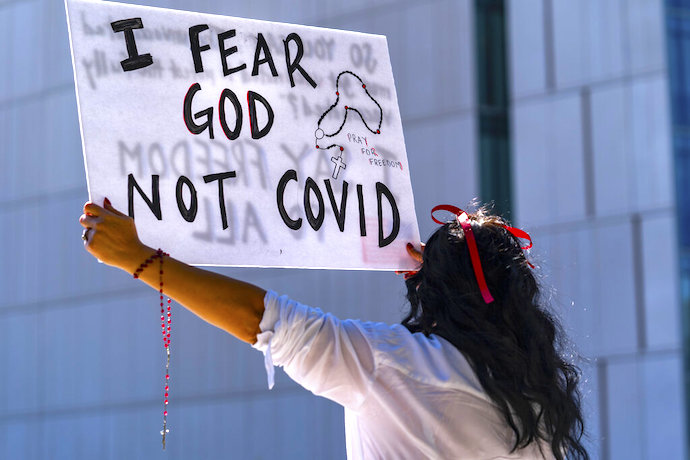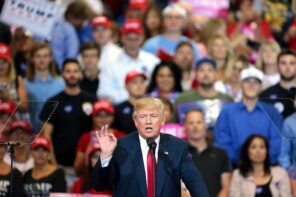In my younger, snottier days, I would have made short work of this piece by Jack Jenkins for Religion News Service:
Q: Could Novavax win over some religious vaccine skeptics?
A: No.
This has been another edition of ‘Simple Answers to Simple Questions.’
These days, I’m willing to give Jenkins’ question a “probably not,” with some explanation.
Let’s stipulate that the Novavax COVID shot, which is currently pending FDA approval, could potentially be attractive to some religious holdouts. According to the manufacturer, the vaccine was tested and manufactured without the use of “human fetal-derived cell lines or tissues,” which has long been a stated sticking point for some abortion opponents, guidance from the Catholic church notwithstanding.
So it’s possible that some vaccine refusers might see Novavax as a satisfactory alternative to the Moderna, Pfizer or Johnson & Johnson doses currently available in the U.S. But that word “some” is doing a lot of work here. As Jenkins points out, only about one-in-ten Americans claim religious objections to COVID vaccination. That figure comes from a PRRI poll, which doesn’t break down the objections any further. Meaning, we don’t know how much of that 10% is rooted in concerns over abortion.
It could be that people are balking because they see vaccination as unnecessary, or because they see vaccines as contaminants, both of which are fairly common objections linked to religious mindsets. And as law professor Dorit Reiss writes in the Washington Post, “We know that Americans game religious exemptions, because they tell us.” That’s a nice way of saying that they lie.
Jenkins asks some anti-abortion activists for their reaction, but even they turn out to be ambivalent. One embraces the Novavax shot, one insists that despite its denials Novavax did use fetal cell lines, and one proclaims herself confused and leaves it at that.
I’m not seeing a lot of evidence that “some” adds up to a significant number. Not, at least, on the grounds of Novavax’s supposed selling point.
To be fair, that’s not all there is to the piece. In fact, the question about Novavax’s allure reads like a wrapper for a bigger narrative about anti-vaxx activism merging with right-wing Christian nationalism. There’s an interesting story to be told there, and you should follow all the links in Jenkins’ piece. But the sales pitch of a new vaccine doesn’t seem like the right frame for that story. It might be a shoehorn too far, so to speak.
For one thing, folding the vaccine into a culture war narrative lets the manufacturer off far too easily. They claim their shot is 90% effective against the original strain of COVID, and that it “generates an immune response against the omicron variant.” That’s a less-than-helpful formulation, given that the original strain has long since been pushed out of the ecosystem by Delta and Omicron (to say nothing of “Omicron 2”). Is there anything to recommend this shot, other than how it was developed? If not, it seems like a pretty cheap tout.
Moreover, touting the drug’s fetal-cell-free origins potentially undermines the adoption of rival medications by keeping alive the far-fetched idea that to use them is to be somehow complicit in abortion. That’s a big enough problem these days, but it could be even worse when the next pandemic comes.
As someone who helps to organize COVID vaccine clinics, I’d be happy to know that there was a dose available to satisfy the concerns of people who might otherwise refuse to take a shot. As an observer of the social and political scene, I’m less keen to have healthcare segmented by questions about whether or not a medication may have possibly originated from a cell line derived from an abortion 40 to 50 years and literally thousands of generations ago. Even Robert Jeffress saw that argument for the hot mess that it is, so why give it air again?
For another thing, while it’s always a bit too easy to play “gotcha!” with angles not taken in any particular news piece, I feel like there’s a lot left on the vine here. I want to mention three lines of inquiry that I would have liked to see pursued in this piece:
We know, for example, that Hispanic and Latinx citizens have been bombarded with disinformation since the 2020 election, often centered around abortion and/or vaccination, and often spread through religious leaders. It’s not at all uncommon for immigrants to express reluctance to receive a COVID vaccination because they’ve heard that the shots can affect fertility, or that they’re manufactured with aborted fetuses, taking the objections mentioned above and putting them on steroids.
Given that context, it would certainly be worthwhile to evaluate Novavax’s potential against the determined (and often covert) opposition to any kind of vaccination in some of the very communities in which it might be supposed to have great appeal.
In short: Novavax might convince some people to get vaccinated, but could it also run into a brick wall? Who would be opposed to it? What would they stand to gain from it? These are all questions worth exploring, more interesting than collecting soundbites from hard-right Catholic activists, in my opinion.
Along the same lines, I wish Jenkins had drawn out some of the racial dynamics that lurk in these stories. Bradley Onishi, for example, has pointed out the ways in which a single-minded focus on abortion serves the cause of white Christian privilege. Refusal to accept vaccines derived, however remotely, from fetal cells might be an act of principled opposition, in other words—or it could be a convenient excuse for people who aren’t going to get vaccinated no matter what.
There’s also been a lot of reporting over the past year in particular about how right-wing extremists have been infiltrating and subverting more mainstream conservative causes, such as the white nationalists working their way into the anti-abortion movement. It’s not a huge deal, but given his other reporting interests, I’m a bit surprised that Jenkins left this angle untouched. We know from his own reporting that Christian nationalists are lining up, not just behind former president Donald Trump, but also anti-vaxx activism.
That has implications for the acceptance of Novavax, of course, but also for the general development of right-wing activism. That is, there might be a whole lot more to vaccine refusal than a desire to avoid certain kinds of medication, and that “more” might be helping to feed the energy of some of the most disturbing actors in contemporary politics.
All of this is definitely worth drawing out.
More generally, I think there’s an ongoing need for journalists to take conspiratorial mindsets seriously when reporting on religion. That’s not a criticism of Jenkins—hardly any reporters engage this difficult terrain. Conspiracy thinking and faith aren’t necessarily identical, or even equivalent. But they come from the same spaces in our personalities hungry for meaning and purpose and belonging. Those spaces tend to be highly resistant to things like reason, argument, and evidence, and they seem to be highly challenged by this day and age.
There’s a reason people are firm in their belief that even the most tangential connection to abortion is involvement in murder, is what I’m saying. There’s also a reason they feel that opposition to abortion—again, no matter how remote the connection—outweighs the direct and tangible results that can be seen in being vaccinated. It might have something to do with the information they’ve been given, or their religious or racial identity, or their need for quick answers to complex problems that absolve them and their community of blame.
It seems to me that the story of COVID and vaccination can’t be understood without probing those facets. That’s particularly true when looking at the religious dimensions of the pandemic. Sure, Novavax might win over some religious vaccine skeptics. But what drives those skeptics in the first place? That’s what I’m really curious about.
Addendum:
[The claims Zoloth reviewed] often had a fantastic or magic quality. People worried about the calcification of their pineal gland, or interference with their auras, or a disruption of a natural order given by God or gods. Appeals to Native American spirituality and “nature” were raised (even though actual Native American communities had one of the highest vaccination acceptance rates in the country). There were many conspiracy theories with this fantastic quality, some of which came close to medieval blood libels: that unborn babies had been aborted for use in the vaccine, or that contamination of one’s blood (or worse, one’s DNA) was at stake, as if it were an assault on the purity of the soul. Many of the objections used religious language to evoke truth claims that were unhinged from the facts about immunology. The fact that mRNA vaccines were tested in human cell cultures made from cell lines from fetal tissue gathered years previously, just like Tylenol, Pepto-Bismol, Tums, Motrin, Benadryl, Sudafed, Preparation H, Claritin, and Prilosec, was not clearly understood.
###
The author encourages reader feedback and tips: dan@religiondispatches.org





